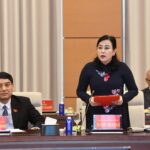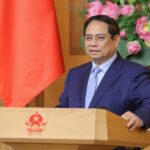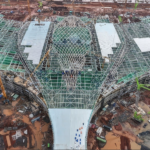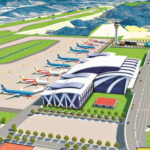Deputy Prime Minister Nguyen Hoa Binh said that so far, there have been around 4-5 domestic enterprises proposing to undertake the project, and the number is expected to increase.
On the enterprises proposing to undertake the project
What is the significance of the National Assembly’s passage of the amended Railway Law in attracting private enterprises to invest in the North-South high-speed railway project, Mr. Deputy Prime Minister?
The policy of investing in the high-speed railway project with public investment has been approved by the National Assembly at the previous session. If we implement it with public investment, everything will follow the resolution of the National Assembly. But recently, after the Politburo issued a resolution on private sector development, which assessed that the private sector is the leading force in innovation, technology application, and productivity improvement, and has the capacity to implement national key projects, the state needs to have a mechanism for private sector participation in strategic and large-scale infrastructure projects.
In fact, in the past time, many large-scale projects such as expressways, renewable energy projects, large bridges, mountain tunnels… have been well implemented by private enterprises. They are fully capable of undertaking large-scale projects, including the North-South high-speed railway project.
Regarding the high-speed railway project, how many private enterprises have proposed to invest so far, sir?
After the project was approved by the National Assembly, especially after the Politburo and the National Assembly issued resolutions on private sector development, so far, 4-5 private enterprises have sent proposals to the government to implement the project.
I am sure that this number will increase in the coming time. The government welcomes these proposals, the more private enterprises participating, the better. Not just 4-5 enterprises, if there are 10, 15 or 20 private enterprises proposing to undertake the North-South high-speed railway project, it would be even better.
Laying the foundation for the railway industry
What is the significance of the participation of domestic private enterprises in railway projects, in your opinion?
The North-South high-speed railway project is a “boost” for the economy. We cannot delay any longer and continue to travel on the current railway lines.
Therefore, when implementing the North-South high-speed railway project, it must be modern and meet international standards. The project implementation process must prevent waste and cost overruns; prevent “interest groups”, negativity, “backyard”, and shorten construction time, quickly putting the project into operation.
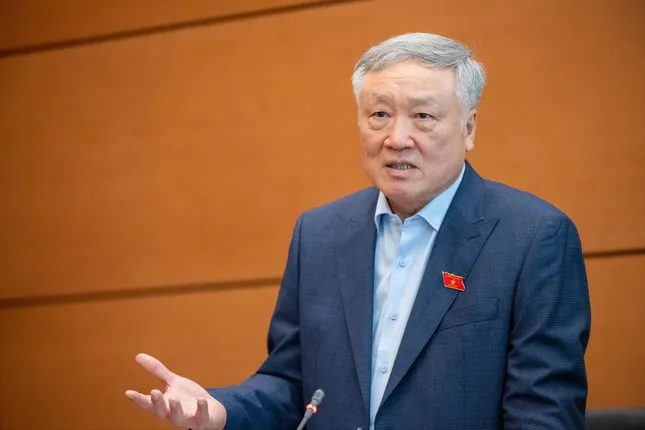
Deputy Prime Minister Nguyen Hoa Binh
In practice, the two urban railway projects of Cat Linh – Ha Dong (Hanoi) and Ben Thanh – Suoi Tien (Ho Chi Minh City) have left us with many lessons and experiences.
If we spend tens of billions of dollars but only get one route, the efficiency is also very limited. What we need is not just a route serving the people and economic development, but also to form a railway industry; train skilled engineers and master the technology. At the same time, the project will promote the formation of a chain of cities, with each station as a cultural, tourist, industrial, and service center – creating a comprehensive development ecosystem.
Spending 60-70 billion USD to form such an ecosystem is truly a success. If there is only one route, it is not enough. We cannot let the situation be like the two current urban railway lines – even minor breakdowns depend on foreign countries.
If we follow the old way, Vietnamese enterprises will forever be subcontractors. We must change our thinking and methods to master our future.
What needs to be done to achieve these goals, sir?
We need the right way and effective direction. When many private enterprises propose to participate, the Government has proposed to the National Assembly to amend the Railway Law, supplementing other investment forms besides public investment.
Previously, the law only allowed public investment, and through the two urban routes, it is clear that the old method has many problems. It is gratifying that the Government’s proposal has been approved by the National Assembly. Thus, the legal corridor is available. Now is the time to evaluate which model is best: public investment, public-private partnership, or purely private investment. The government will consider carefully and specifically.
Transparency and anti-“interest groups”
What will be the criteria for selecting private enterprises to participate, Mr. Deputy Prime Minister?
If we build a railway, it must be of international standard. From design, supervision to appraisal must be done by international units because we lack experience. We have to invite the most developed country to evaluate. The method is to “stand on the shoulders of giants”, if we don’t know, we must learn.
Therefore, in the future, the Government will develop clear criteria and transparency in selecting private enterprises to build the North-South high-speed railway, including: financial capacity; capital mobilization capability; construction experience, technological level, construction time, and specific commitments. All these criteria will be evaluated by the State Council and publicly and transparently announced. There is no story of secretly appointing Mr. A or Mr. B.
The government expects not only to have a North-South high-speed railway but also a modern railway industry, a connected ecosystem from North to South, contributing to sustainable development. We need to think further – not just building railways for Vietnam but also aiming to implement them in other countries.
Thank you, Deputy Prime Minister!
Opening the door for private investment in high-speed railways
On the morning of June 27, with the majority of votes in favor, the National Assembly passed the amended Railway Law, officially allowing private enterprises to invest in railway projects. However, the Law stipulates that investors shall not transfer projects, transfer project enterprises, capital, and assets formed during and after investment to foreign organizations or individuals or organizations with foreign investment capital; The investor shall hand over all assets formed from the project to the State free of charge after the end of the project’s operation.
At the 9th session, the National Assembly agreed with the Government’s proposal to supplement the investment form of the North-South high-speed railway. Accordingly, the National Assembly agreed to supplement the investment form according to the Law on Investment in the form of public-private partnership and business investment according to the Law on Investment for the North-South high-speed railway project on the North-South axis, in addition to public investment. The National Assembly assigned the Government to organize the selection of investment forms and investors in accordance with regulations.
Unveiling Key Decisions: A Glimpse into the Inner Workings of Vietnam’s Political Elite
The Executive Committee of the Party Central Committee of the National Assembly held its 4th conference, announcing the decisions of the Politburo and the Secretariat, as well as the resolution of the National Assembly’s Standing Committee on personnel work.
“UK Prime Minister Encourages Businesses to Elevate Bilateral Trade and Investment Beyond $10 Billion”
“On June 28, Prime Minister Pham Minh Chinh hosted a dialogue with British businesses investing and operating in Vietnam at the Government Headquarters. The event underscored the government’s commitment to fostering a conducive investment environment and strengthening economic ties between Vietnam and the UK.”
The Ultimate $16 Billion Trade Hub: Unlocking Vietnam’s National Landmark Project
The $16 billion free trade area will be constructed in one of Vietnam’s foremost provinces for industrial development.


